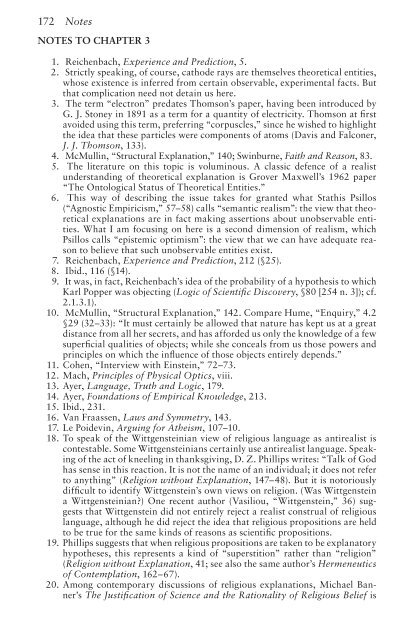Theism and Explanation - Appeared-to-Blogly
Theism and Explanation - Appeared-to-Blogly
Theism and Explanation - Appeared-to-Blogly
Create successful ePaper yourself
Turn your PDF publications into a flip-book with our unique Google optimized e-Paper software.
172 Notes<br />
NOTES TO CHAPTER 3<br />
1. Reichenbach, Experience <strong>and</strong> Prediction, 5.<br />
2. Strictly speaking, of course, cathode rays are themselves theoretical entities,<br />
whose existence is inferred from certain observable, experimental facts. But<br />
that complication need not detain us here.<br />
3. The term “electron” predates Thomson’s paper, having been introduced by<br />
G. J. S<strong>to</strong>ney in 1891 as a term for a quantity of electricity. Thomson at fi rst<br />
avoided using this term, preferring “corpuscles,” since he wished <strong>to</strong> highlight<br />
the idea that these particles were components of a<strong>to</strong>ms (Davis <strong>and</strong> Falconer,<br />
J. J. Thomson, 133).<br />
4. McMullin, “Structural <strong>Explanation</strong>,” 140; Swinburne, Faith <strong>and</strong> Reason, 83.<br />
5. The literature on this <strong>to</strong>pic is voluminous. A classic defence of a realist<br />
underst<strong>and</strong>ing of theoretical explanation is Grover Maxwell’s 1962 paper<br />
“The On<strong>to</strong>logical Status of Theoretical Entities.”<br />
6. This way of describing the issue takes for granted what Stathis Psillos<br />
(“Agnostic Empiricism,” 57–58) calls “semantic realism”: the view that theoretical<br />
explanations are in fact making assertions about unobservable entities.<br />
What I am focusing on here is a second dimension of realism, which<br />
Psillos calls “epistemic optimism”: the view that we can have adequate reason<br />
<strong>to</strong> believe that such unobservable entities exist.<br />
7. Reichenbach, Experience <strong>and</strong> Prediction, 212 (§25).<br />
8. Ibid., 116 (§14).<br />
9. It was, in fact, Reichenbach’s idea of the probability of a hypothesis <strong>to</strong> which<br />
Karl Popper was objecting (Logic of Scientifi c Discovery, §80 [254 n. 3]); cf.<br />
2.1.3.1).<br />
10. McMullin, “Structural <strong>Explanation</strong>,” 142. Compare Hume, “Enquiry,” 4.2<br />
§29 (32–33): “It must certainly be allowed that nature has kept us at a great<br />
distance from all her secrets, <strong>and</strong> has afforded us only the knowledge of a few<br />
superfi cial qualities of objects; while she conceals from us those powers <strong>and</strong><br />
principles on which the infl uence of those objects entirely depends.”<br />
11. Cohen, “Interview with Einstein,” 72–73.<br />
12. Mach, Principles of Physical Optics, viii.<br />
13. Ayer, Language, Truth <strong>and</strong> Logic, 179.<br />
14. Ayer, Foundations of Empirical Knowledge, 213.<br />
15. Ibid., 231.<br />
16. Van Fraassen, Laws <strong>and</strong> Symmetry, 143.<br />
17. Le Poidevin, Arguing for Atheism, 107–10.<br />
18. To speak of the Wittgensteinian view of religious language as antirealist is<br />
contestable. Some Wittgensteinians certainly use antirealist language. Speaking<br />
of the act of kneeling in thanksgiving, D. Z. Phillips writes: “Talk of God<br />
has sense in this reaction. It is not the name of an individual; it does not refer<br />
<strong>to</strong> anything” (Religion without <strong>Explanation</strong>, 147–48). But it is no<strong>to</strong>riously<br />
diffi cult <strong>to</strong> identify Wittgenstein’s own views on religion. (Was Wittgenstein<br />
a Wittgensteinian?) One recent author (Vasiliou, “Wittgenstein,” 36) suggests<br />
that Wittgenstein did not entirely reject a realist construal of religious<br />
language, although he did reject the idea that religious propositions are held<br />
<strong>to</strong> be true for the same kinds of reasons as scientifi c propositions.<br />
19. Phillips suggests that when religious propositions are taken <strong>to</strong> be explana<strong>to</strong>ry<br />
hypotheses, this represents a kind of “superstition” rather than “religion”<br />
(Religion without <strong>Explanation</strong>, 41; see also the same author’s Hermeneutics<br />
of Contemplation, 162–67).<br />
20. Among contemporary discussions of religious explanations, Michael Banner’s<br />
The Justifi cation of Science <strong>and</strong> the Rationality of Religious Belief is



